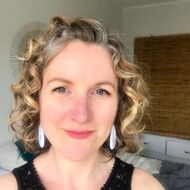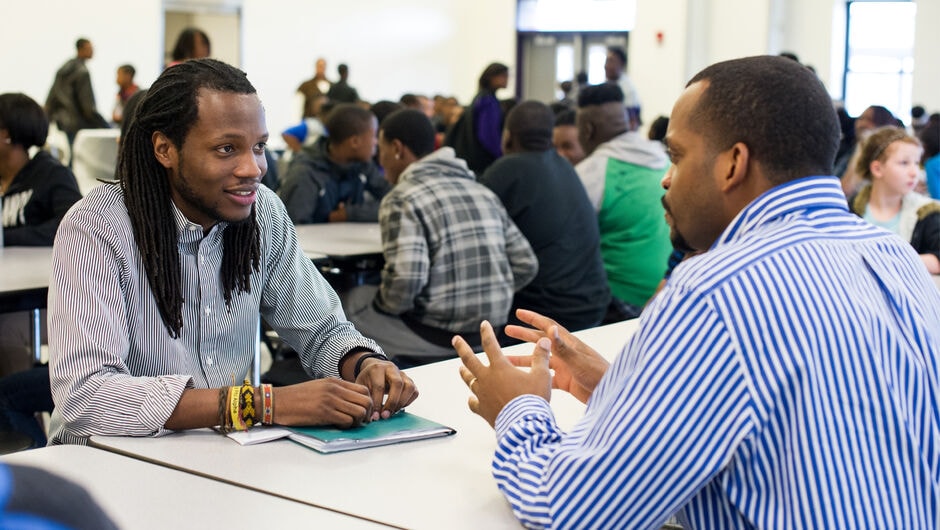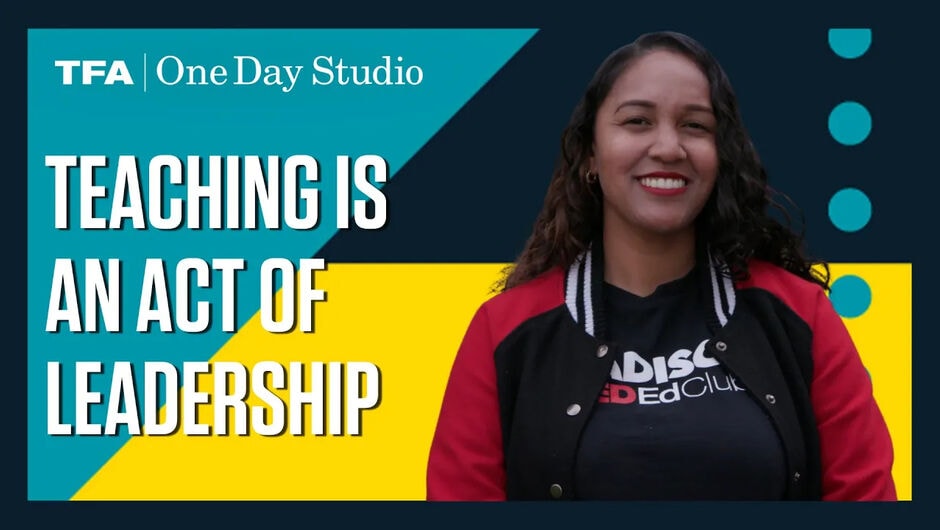Learning as Leaders: Meet Our 2020 Forbes 30 Under 30 Honorees
Teach For America alumni on the 2020 Forbes 30 Under 30 list share the moments and the people who shaped them as leaders.
Forbes recently named its 2020 30 Under 30 honorees. The list recognizes young professionals who have made a significant impact early on in their careers. Five Teach For America alumni made the list this year, joining more than 50 other alumni who have been recognized since 2012.
Meet This Year's Honorees
Samantha Pratt (Miami-Dade ‘15), the founder and CEO of KlickEngage, a free mental health app that provides lifesaving tools for students and teachers.
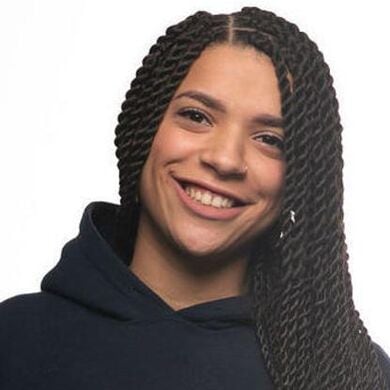
Gavin Schiffres and Jack Krewson, two 2015 St. Louis alumni and cofounders of Kairos Academies, a school that is challenging the traditional model of education and reimagining the learning experience for students in St. Louis.
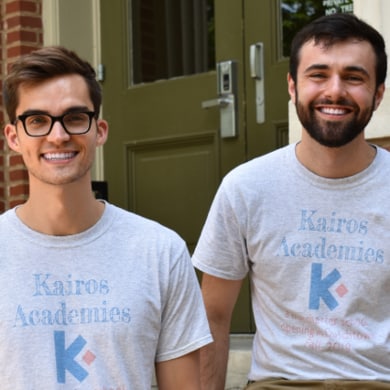
Michael Hamamoto Tribble (Bay Area ‘13), who heads up education strategy for Google Cloud and is leading initiatives in the tech field that prepare students for careers that are in high demand.
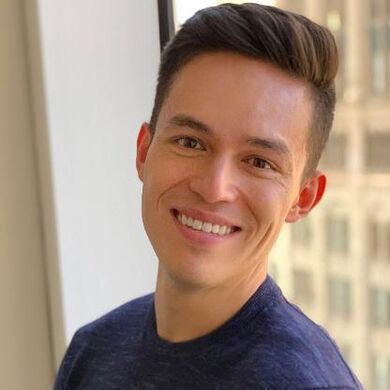
Pavan Patel (Bay Area ‘12), the co-founder of Shiftsmart, a tool that helps businesses better manage contract workers.
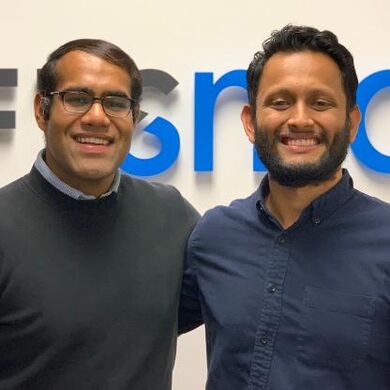
We asked this year’s honorees to tell us how the classroom paved the way for their subsequent career paths, the challenges they encountered, and the lessons they learned along the way. They opened up about the often scrappy life of entrepreneurs, and how striving for more equitable opportunities for their students keeps them driving forward.
It All Started in the Classroom
This year’s TFA Forbes honorees were ignited by a desire to address their students’ unmet needs.
Samantha says she was motivated to launch KlickEngage because she wanted to create a solution to a problem she was seeing every day in the classroom. As a teacher, she felt unable to address the underlying issues that prevented her students from being able to engage in class.
“In the classroom, I could see the behavioral and academic consequences of complex trauma my students were dealing with,” Samantha says. “But I was so overwhelmed by the chaos of my school's environment and the expectations of the state, that I could only react to problems. I knew that if I could just better understand my students before we dove into our 90-minute science lessons, they would feel safer and better equipped to learn.”
In establishing Kairos Academies, cofounders Gavin and Jack were also motivated by the frustrations they felt as teachers, and a desire to do more to set students up for success.
“Our classroom experience showed us that to develop independent learners who will thrive in college, we had to give students choice over when, where, how, and with whom to work,” Gavin and Jack say. “Our students had distinctive, wide-ranging needs. We wanted to see if we could leverage technology and flexible schedules to personalize their learning experiences.”
Leveraging technology to improve outcomes for kids resonates from Michael’s corps experience as well, and ultimately led him to a career path in tech.
“As a special education teacher, I knew firsthand the impact that tools like assistive technologies and G Suite had on student outcomes and classroom productivity,” Michael says.
The Biggest Learning Curve
Michael says the biggest learning curve he’s encountered as a leader is learning how to say no in order to establish boundaries and have a healthy work-life balance.
“As teachers, the work so easily becomes personal, so it’s easy to let the lines blur between work and personal life, but it’s really not sustainable in the long term,” he says.
Learning how to delegate has been his biggest challenge coming out of the classroom for both Gavin and Jack. It’s a lesson they've learned the hard way after feeling the burnout from trying to do it all on their own.
“It very quickly becomes too much to manage yourself, even if you work on nights, weekends, and vacations,” Gavin says. “Learning how to delegate, trust, and support others towards a shared vision has been the hardest part about transitioning from a teacher to founder, where you're basically responsible for everything. Being a leader means you need to depend on others.”
Samantha also agrees that depending on others is essential to achieving your big vision. But it takes time, and a supportive network to hone those skills. During grad school, she took a full-time job managing college students at Jumpstart, an early education program, so she could learn best practices for management in an established organization.
“I had never managed more than a few people, so I didn't feel equipped to truly run a company,” Samantha says. “I leveraged my supervisors and team to fill in knowledge gaps. I don't think I am now a perfect manager, but I do think that I am better than I was. It is all about being willing to put in the work to learn and grow.”
The Power of a Supportive Network
Samantha says that her network has been instrumental in helping her gain experience as a young entrepreneur.
“I had no business or tech background when I started KlickEngage,” Samantha says. “I have been climbing up a hill since I started. However, I surround myself with amazing people who help me figure things out every day and I seek out experiences to learn.”
Gavin and Jack have also surrounded themselves with mentors and leaders, including veteran educators, corps members, and alumni in the St. Louis area. Among the many people who’ve helped to get Kairos Academies off the ground, the cofounders say there are a few TFA alumni who stand out: Eric Scroggins, a 2001 New York alum and founder and CEO of the Opportunity Trust, a nonprofit organization that offers support for innovative schools in St. Louis. Kyle Shaffer (Greater New Orleans ‘05) who has spent over 10 years leading schools within the KIPP public charter school network. And Laura Vilines (St. Louis ‘06) who leads the St. Louis Teacher Residency, which offers a pathway to teaching in St. Louis public schools.
“When Eric found us, we were working three part-time jobs and trying to piece Kairos together at night in our kitchens,” Gavin and Jack say. “He took the vision and, through The Opportunity Trust (which he founded), connected us to funders and experts who showed us how to actually make it happen.”
“He also connected us to Kyle, a former principal and current head of schools, who served as a part-time leadership coach, and part-time cheerleader who motivated us through the (often precarious) school startup journey.”
“Finally, Laura Vilines was one of our founding board members. She is a pedagogical expert who started her own charter network in Nashville (STEM Prep), and she gave us invaluable feedback and advice as we crafted our model and vision.”
Looking to the Future
As the leaders look to the future, they are focused on an ongoing cycle of learning and continuously improving as they expand their work.
“Above all, we want to be a learning organization that is always evolving, adapting, and growing to better achieve our mission,” Gavin and Jack say. “With this growth mindset, we believe that Kairos can be a proof-point charter network. In five years, we want to be a pillar of excellence that, hopefully, stands out less because others in the area have started to adopt some of our ideas.”
Samantha echoes the focus on learning.
“Right now, we are trying to make sure that we are really making a difference,” she says. “We've recently closed some of our first contracts and we are going to be spending the next few months evaluating our impact and expanding our reach. In the near future, we are prioritizing the issue of access to support and testing some really exciting solutions.”
Michael agrees that expanding access is a big part of his vision for his future work at Google.
“Just as Teach For America’s mission is that one day all children in our nation will have the opportunity to attain an excellent education, so too do I hope one day to expand access to computer science, both the understanding of it, but also the resources to take advantage of those opportunities.”
We want your feedback. Share your thoughts on this story or suggest other stories for us to pursue.
Sign up to receive articles like this in your inbox!
Thanks for signing up!
Content is loading...


